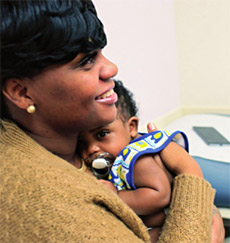Providing Psychologists in a Primary Care Setting
Jace Luster is at the Hopple Street Neighborhood Health Center for his 1-month, well-child checkup. He’s clearly growing and developing well, doing everything you’d expect a 1-month-old to do — and more.
In fact, when psychologist Rachel Herbst, PhD, asks his parents “What are your favorite things he’s doing,” they tell her Jace is already trying to lift his head.
Promoting Child Behavioral Health, Effective Parenting and Family Strengths
You may wonder: Why is a psychologist in the exam room for a newborn’s 1-month checkup?
The answer is that Dr. Herbst is a member of an innovative team at the primary care center Cincinnati Children’s operates in North Fairmount, a medically underserved neighborhood. Doctors and psychologists there collaborate to provide medical and behavioral health services during well-child visits for children from birth to age 5.
Dr. Herbst’s focus is on how children are developing and how their families are functioning. She identifies and praises what parents are doing well, and coaches them on what to expect as their child moves to the next developmental stage.
If the family needs additional support, she can arrange follow-up counseling.
Problem-solving and Reassurance
Indiya Black tells Dr. Herbst that Jace sleeps when she’s up and is awake when she needs to sleep. She’s exhausted. Dr. Herbst talks about ways the family can try to reset Jace’s sleep pattern.
They share another concern: Are they spoiling Jace by holding him too much when he cries? Dr. Herbst reassures them. She explains that Jace is too young to calm himself. That part of his brain isn’t developed yet. Holding him is the right thing to do and will help him learn to soothe himself when he’s a few months older.
She says her goodbyes as pediatrician Sarah Schechter, MD, continues with the checkup. Dr. Herbst will see the family again at Jace’s 2-month visit — and hopes baby and parents are all sleeping better by then.





